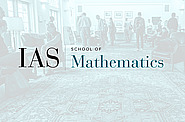Seminars
Dec
05
2016
Computer Science/Discrete Mathematics Seminar I
On the number of ordinary lines determined by sets in complex space
11:15am|S-101
Nov
29
2016
Computer Science/Discrete Mathematics Seminar II
Combinatorial rigidity of graphs embedded in $\mathbb{R}^2$
Orit Raz
10:30am|S-101
Nov
28
2016
Computer Science/Discrete Mathematics Seminar I
Stochastic block models and probabilistic reductions
11:15am|S-101
Nov
22
2016
Nov
21
2016
Computer Science/Discrete Mathematics Seminar I
On the effect of randomness on planted 3-coloring models
Uri Feige
11:15am|S-101
Nov
15
2016
Computer Science/Discrete Mathematics Seminar II
Non-malleable extractors for constant depth circuits, and affine functions
10:30am|S-101
Nov
14
2016
Nov
08
2016
Computer Science/Discrete Mathematics Seminar II
Exact tensor completion via sum of squares
10:30am|S-101
Nov
07
2016
Computer Science/Discrete Mathematics Seminar I
Non-unique games over compact groups and orientation estimation in cryo-EM
Amit Singer
11:15am|S-101
Nov
01
2016
Computer Science/Discrete Mathematics Seminar II
Settling the complexity of computing approximate two-player Nash equilibria
Aviad Rubinstein
10:30am|West Building Lecture Hall
